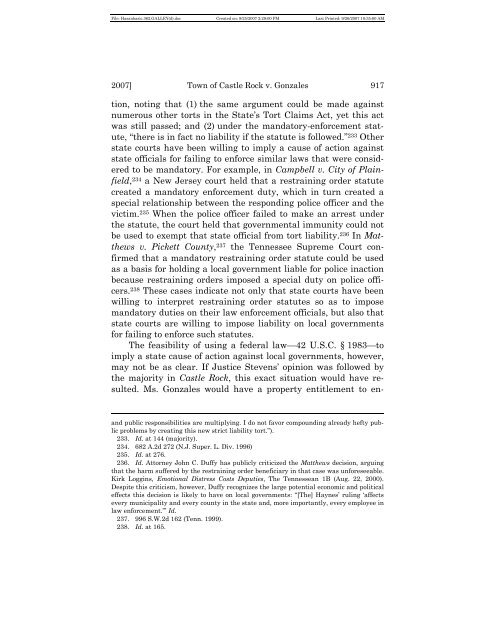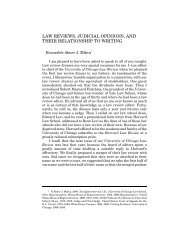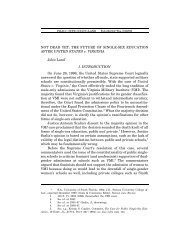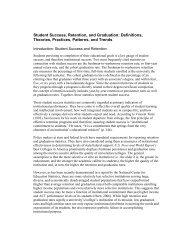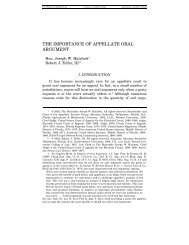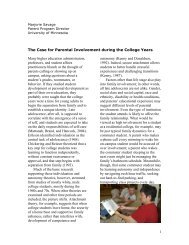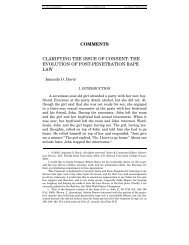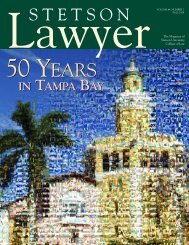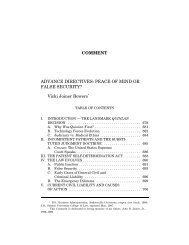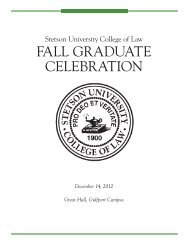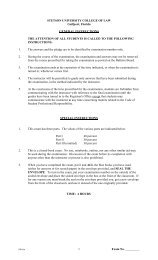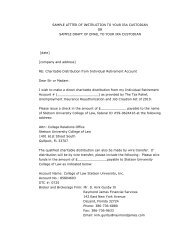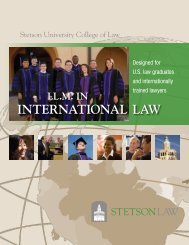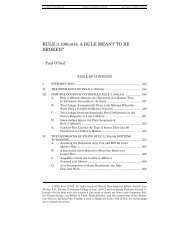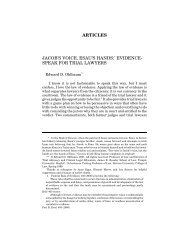TOWN OF CASTLE ROCK v. GONZALES: THE ... - Stetson University
TOWN OF CASTLE ROCK v. GONZALES: THE ... - Stetson University
TOWN OF CASTLE ROCK v. GONZALES: THE ... - Stetson University
You also want an ePaper? Increase the reach of your titles
YUMPU automatically turns print PDFs into web optimized ePapers that Google loves.
File: Hasanbasic.362.GALLEY(d).doc Created on: 9/25/2007 2:29:00 PM Last Printed: 9/26/2007 10:35:00 AM2007] Town of Castle Rock v. Gonzales 917tion, noting that (1) the same argument could be made againstnumerous other torts in the State’s Tort Claims Act, yet this actwas still passed; and (2) under the mandatory-enforcement statute,“there is in fact no liability if the statute is followed.” 233 Otherstate courts have been willing to imply a cause of action againststate officials for failing to enforce similar laws that were consideredto be mandatory. For example, in Campbell v. City of Plainfield,234 a New Jersey court held that a restraining order statutecreated a mandatory enforcement duty, which in turn created aspecial relationship between the responding police officer and thevictim. 235 When the police officer failed to make an arrest underthe statute, the court held that governmental immunity could notbe used to exempt that state official from tort liability. 236 In Matthewsv. Pickett County, 237 the Tennessee Supreme Court confirmedthat a mandatory restraining order statute could be usedas a basis for holding a local government liable for police inactionbecause restraining orders imposed a special duty on police officers.238 These cases indicate not only that state courts have beenwilling to interpret restraining order statutes so as to imposemandatory duties on their law enforcement officials, but also thatstate courts are willing to impose liability on local governmentsfor failing to enforce such statutes.The feasibility of using a federal law—42 U.S.C. § 1983—toimply a state cause of action against local governments, however,may not be as clear. If Justice Stevens’ opinion was followed bythe majority in Castle Rock, this exact situation would have resulted.Ms. Gonzales would have a property entitlement to enandpublic responsibilities are multiplying. I do not favor compounding already hefty publicproblems by creating this new strict liability tort.”).233. Id. at 144 (majority).234. 682 A.2d 272 (N.J. Super. L. Div. 1996)235. Id. at 276.236. Id. Attorney John C. Duffy has publicly criticized the Matthews decision, arguingthat the harm suffered by the restraining order beneficiary in that case was unforeseeable.Kirk Loggins, Emotional Distress Costs Deputies, The Tennessean 1B (Aug. 22, 2000).Despite this criticism, however, Duffy recognizes the large potential economic and politicaleffects this decision is likely to have on local governments: “[The] Haynes’ ruling ‘affectsevery municipality and every county in the state and, more importantly, every employee inlaw enforcement.’” Id.237. 996 S.W.2d 162 (Tenn. 1999).238. Id. at 165.


